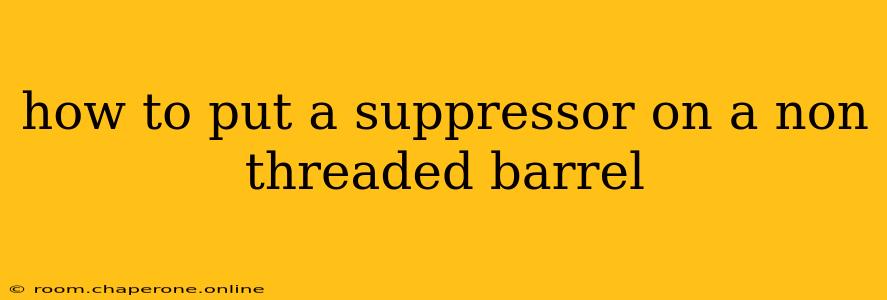Adding a suppressor to your firearm can significantly reduce noise and recoil, enhancing both safety and shooting comfort. However, suppressors require a threaded barrel for proper attachment. If your barrel isn't threaded, you're faced with a decision: thread the barrel itself or explore alternative solutions. This guide explores the possibilities, weighing the pros and cons of each.
Understanding the Challenge: Why Threaded Barrels are Necessary
Suppressors, also known as silencers, rely on a threaded connection to securely mount to the firearm's barrel. This precise fit ensures proper alignment and gas sealing, preventing blowback and maximizing suppression effectiveness. Attempting to attach a suppressor to a non-threaded barrel is unsafe and ineffective.
Option 1: Threading Your Barrel – The Most Common Solution
The most direct and effective solution is to have your barrel professionally threaded. This involves a gunsmith carefully machining threads onto the end of your barrel, creating a secure and reliable connection for the suppressor.
Pros of Threading:
- Best Performance: Provides the most secure and effective suppressor attachment, leading to optimal sound suppression and reduced recoil.
- Cleanest Solution: The most aesthetically pleasing option, as it integrates the suppressor seamlessly with the barrel.
- Wide Suppressor Compatibility: Allows you to use a wider range of suppressors designed for various calibers and firearm types.
Cons of Threading:
- Cost: Professional threading services can be expensive, varying depending on the gunsmith and barrel material.
- Permanence: Threading alters the barrel permanently.
- Potential for Damage: Improper threading can damage the barrel, necessitating replacement. Choose a reputable and experienced gunsmith.
Option 2: Utilizing a Muzzle Device with Integrated Threads
Some muzzle devices, such as flash hiders or brakes, are designed with integrated threads specifically for attaching suppressors. These devices attach to the existing barrel crown, providing a threaded interface without modifying the barrel itself.
Pros of Muzzle Devices:
- Non-Permanent Modification: The muzzle device can be removed, leaving the barrel unaltered.
- Potential Cost Savings: May be less expensive than threading the barrel.
- Added Benefits: Often provide additional benefits beyond suppressor mounting, such as flash reduction or recoil mitigation.
Cons of Muzzle Devices:
- Potential for Reduced Suppressor Effectiveness: May not provide as secure a connection as directly threading the barrel, potentially impacting sound suppression.
- Limited Compatibility: The choice of suppressor is restricted to those compatible with the specific muzzle device.
- Added Length: Increases the overall length of the firearm.
Option 3: Consider a Different Firearm
If you’re unwilling to modify your current firearm, purchasing a firearm already equipped with a threaded barrel may be the simplest solution. This avoids the cost and potential issues associated with barrel threading or muzzle device installations.
Pros of Buying a New Firearm:
- Simplicity: Avoids potential complications and costs of modifications.
- Factory Precision: Ensures correct and reliable suppressor mounting from the manufacturer.
Cons of Buying a New Firearm:
- Cost: Requires a significant financial investment.
- Logistics: The process of acquiring a new firearm depends on applicable local and federal regulations.
Choosing the Right Option: Factors to Consider
The best approach depends on your priorities, budget, and firearm. Consider the following:
- Your Budget: Threading is typically more expensive than using a muzzle device.
- Your Skill Level: Threading requires professional expertise. Incorrect threading can damage the barrel and compromise safety.
- Your Firearm's Value: If your firearm is particularly valuable, professional threading is preferable to avoid potential damage.
- Suppressor Compatibility: Ensure compatibility between your chosen suppressor and the threading or muzzle device.
Disclaimer: Modifying firearms requires specialized knowledge and skill. Always consult with a qualified and experienced gunsmith for any modifications to your firearm. Improper modifications can be dangerous and may void any warranties. Furthermore, always comply with all applicable local, state, and federal laws and regulations regarding firearms and suppressors.

